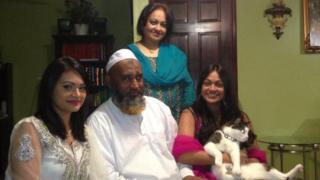US citizen held for war crimes ‘was only 13’
A US citizen of Bangladeshi descent has been arrested during a visit to his native country for allegedly committing “war crimes” during the war of independence from Pakistan in 1971 – a year when his family say he was only 13.
Mohamed Jubair Monir, a New York based businessman, was arrested in a village on 19 December – four weeks after he landed in Bangladesh.
His family in the US say he has not yet even been allowed to make a phone call home.
Mr Monir will be tried by the International Crimes Tribunal (ICT) – a court set up by the Bangladeshi government in 2010 to prosecute those accused of committing war crimes in 1971.
Bangladesh broke away from Pakistan after a war in which hundreds of thousands were killed and more than 10 million fled their homes. The Bangladeshi government says that three million people were killed but that figure is contested.
Pakistani forces were also assisted by local collaborators, and many have been sentenced to death in recent years by the ICT on charges of violent crimes during the nine-month war.
Many human rights activists and legal experts have labelled these trials as deeply flawed.
Detractors accuse the current Sheikh Hasina government of using it as a political weapon to punish opponents, many of them from the country’s main opposition, the Bangladesh Nationalist Party (BNP).
But the government prosecutor in the case, Zead-Al-Malum, has defended the case to the BBC, saying Mr Monir has been under investigation for years.
Mr Monir, a US citizen for more than 27 years, has been visiting Bangladesh almost every year to tend to his rice mill and fishery business.
His family fears he was targeted during this trip as part of the alleged crackdown by Prime Minister Hasina against political opponents just before the 30 December elections.
“He has nothing to do with politics,” says his daughter Srabone Monir.
She says her father was seen having tea in his village with an old family friend, who was running in the parliamentary elections on the BNP ticket, and that may have triggered the government reaction.
She does acknowledge that her grandfather, Abdul Monir, had supported the “losing side [Pakistan]” during the war and that, too, could have made the family a target.
The prosecutor, Mr Malum, said an arrest warrant was issued by the ICT against Mohamed Jubair Monir after several years of investigation.
“He has been charged with abduction, confinement, murder, torture, looting and arson in the Hindu-areas of Dhirai and Shala near Sunamganj,” Mr Malum, in Dhaka, told the BBC in a phone call.
He said Mr Monir was part of the Razakar Bahini – a force organised by the Pakistani army comprising pro-Pakistan Bengalis and Urdu-speaking migrants who opposed the idea of an independent Bangladesh.
Mr Malum dismissed allegations of a political vendetta, saying: “He is not a big political figure. We are just following the due process to prosecute those who committed crimes during the liberation war.”
If convicted, he said, Mr Monir could face life imprisonment or even death.
Bangladesh independence war, 1971
Mohamed J Monir came to the United states in 1982, did several odd jobs, and then became a yellow cab driver. In 2001, he started a small business selling incense sticks and perfumes in New York and later also bought two small farms, one in Hamilton, New York and the other in Florida.
“We grow vegetables and fruits there to be sold in the local market, primarily to the Bangladeshi community,” says his other daughter, Monira Monir.
She says they have documents that verify that her father was 13 years of age during the liberation war.
“They have arrested him based on false information and without any factual evidence,” she says.
“My dad was born on January 3, 1958 and he was not in Bangladesh during the war. He was living abroad in Pakistan.”
The family do not have any documents to back their claim regarding his stay in current-day Pakistan during that period but do have his birth certificate, naturalisation certificate, and US driving licence to prove his age.
His daughter says Mr Monir turned to religion much later in life, after a car accident in the mid 1990s in New York, and there is no truth in the allegations that he may have sided with the Islamist groups supporting Pakistan during the liberation war.
“I just want to tell the Bangladesh government that my father has no connection with BNP or any other political or religious group,” she says.
Prosecutor Malum says if the family has the evidence they should bring it to the court instead of going for a “media trial”.
More than 22 days after his arrest, the US embassy was granted consular access to Mr Monir on 10 January.
It came after his family approached their local New York senator, Kirsten Gillibrand, for help. It was through her office they eventually managed to get some information about their father.
The letter from the US embassy in Dhaka to Senator Gillibrand says: “We visited Mr Monir on January 10, 2019. He stated he was in good health and appeared to be as far as my colleagues and I could discern.
“As we understand, Mr Monir’s case will appear before the International Crimes Tribunal on Jan 20. The embassy is closely monitoring the developments.”
Source: Read Full Article



